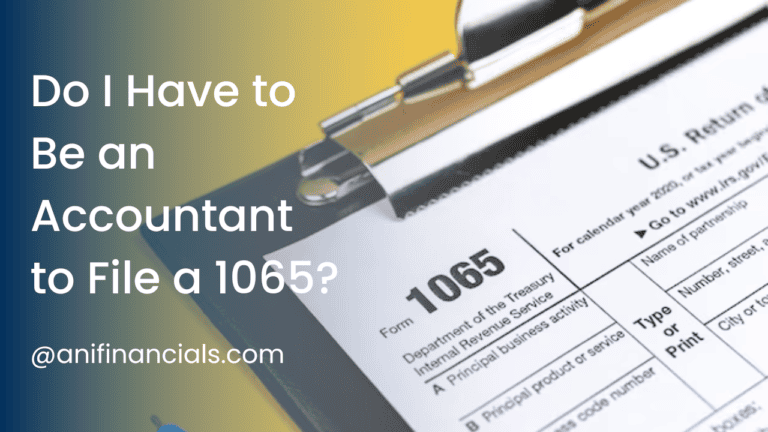Do You File Your Tax Returns by Yourself? BE SAFE!
Filing your own tax returns can be quite a journey. It’s a mix of anticipation and dread, but many people choose to take the plunge and handle it themselves. Why do they do it? Is it worth the effort? Yes, many find it rewarding and cost-effective. Let’s dive into the world of self-filing tax returns and explore everything you need to know to decide if this path is right for you. Read on to discover the benefits, challenges, and tips for filing your tax returns by yourself.
Tax Filing Basics
What is Tax Filing?
Tax filing is the process of submitting your income information to the government. The IRS, or Internal Revenue Service, uses this information to assess your tax liability. Filing your tax returns ensures you pay your taxes and receive any refunds due.
Importance of Filing Tax Returns
Filing tax returns is crucial because it keeps you compliant with federal laws. It’s your responsibility as a taxpayer to report your earnings and pay your taxes. Besides, it’s the key to receiving tax credits and refunds, which can be a nice financial boost.
Key Deadlines for Tax Filing
Interest and penalties can be imposed if you miss a tax deadline. The primary deadline is April 15th, but extensions are available. Keep an eye on specific deadlines for different forms and situations, such as estimated tax payments.
Methods of Tax Filing
Filing Taxes Manually
Manual filing involves completing paper forms and mailing them to the IRS. This method is less common now but still used by some. It requires a good understanding of tax codes and thorough attention to detail.
Using Tax Software
H&R Block or TurboTax simplify tax preparation. These programs guide you through each step, ensuring you don’t miss anything important. They also offer e-filing options, making submission quick and easy.
Hiring a Tax Professional
A tax professional can handle everything for you, from gathering documents to filing your return. This option is great for complex tax situations but can be pricey. However, the peace of mind and accuracy often justify the cost.
Advantages of Filing Taxes Yourself
Cost Savings
One of the main reasons people file their taxes themselves is to save money. Tax preparation services can be expensive, so doing it yourself keeps that cash in your pocket.
Gaining a Better Understanding of Personal Finances
Filing your taxes gives you a detailed look at your finances. You see where your money comes from and where it goes, helping you make better financial decisions throughout the year.
Sense of Accomplishment
There’s a unique satisfaction in tackling your taxes on your own. It’s like solving a challenging puzzle, and when you finish, you feel proud of your accomplishment.
Challenges of Filing Taxes Yourself
Complexity of Tax Codes
Tax codes are notoriously complex. They change frequently, and understanding all the details can be overwhelming. This complexity can lead to mistakes, which might cost you in the long run.
Risk of Errors
Tax return errors can result in penalties and audits. Ensuring accuracy is critical, and double-checking every detail is a must when filing by yourself.
Time-Consuming Nature of the Task
Filing taxes takes time, especially if you have multiple income sources or deductions. Be prepared to spend several hours gathering documents, entering data, and reviewing your return.
Common Tax Forms and Documents
W-2 Forms
W-2 forms report your wages and the taxes withheld from your paycheck. If you’re an employee, your employer will provide this form.
1099 Forms
Various types of income are reported on 1099 forms, such as freelance work or investment earnings. Make sure you collect all relevant 1099s to avoid underreporting your income.
Form 1040 and Its Variants
Form 1040 is the standard federal income tax return form. There are several variants, including the 1040EZ for simple returns and the 1040A for more detailed returns.
Schedule C for Self-Employed Individuals
To report your business income and expenses, you must file a Schedule C if you’re self-employed. This form can be more complex, so be prepared to spend extra time on it.
Deductions and Credits
Standard vs. Itemized Deductions
Standard deductions and itemized deductions are both options. A detailed record of your expenses is needed to itemize for greater tax savings.
Common Tax Credits
Your tax liability is reduced dollar-for-dollar when you claim tax credits. The Earned Income Tax Credit and the Child Tax Credit are two common credits. These can significantly lower the amount of tax you owe.
Education-Related Deductions and Credits
If you’re paying for education, you might qualify for deductions or credits. Two examples of credits that can help offset education costs are the American Opportunity Credit and the Lifetime Learning Credit.
Tax Filing Software Options
Popular Tax Software
TurboTax, H&R Block, and TaxAct are popular choices. Each has its pros and cons, so consider your needs and budget when selecting software.
Pros and Cons of Different Software Options
TurboTax is user-friendly but can be pricey. H&R Block offers in-person assistance if needed, while TaxAct is budget-friendly but less intuitive. Evaluate what matters most to you before deciding.
Simplify Tax Season: Let A&I Financials Guide You
Filing your tax returns by yourself can be daunting, but A&I Financials can ease the process significantly. With their comprehensive accounting services, they ensure your financial data is recorded accurately and securely. They offer customized plans suited for different business needs, providing essential services like tracking income and expenses, bank reconciliation, and tax support.
A&I Financials’ expertise in virtual accounting and their use of advanced software like QuickBooks, Sage, and Xero ensures a seamless tax filing experience. Their professional team, with decades of experience, can help you navigate the complexities of tax codes, reduce the risk of errors, and save time, making sure your tax returns are filed correctly and on time. This personalized support allows you to focus on your core business activities, knowing that your tax obligations are in expert hands.
Tax Filing for Different Income Types
Salaried Employees
If you’re a salaried employee, your tax filing is relatively straightforward. Your employer withholds taxes, and you’ll primarily deal with W-2 forms.
Self-Employed Individuals
Self-employed individuals have more complex filings, dealing with Schedule C and paying estimated taxes quarterly. Keeping accurate records is crucial for these filings.
Freelancers and Gig Workers
Freelancers and gig workers receive 1099 forms instead of W-2s. They must track their income and expenses carefully and may need to make estimated tax payments.
Investors and Those with Capital Gains
If you have investments, you’ll need to report capital gains or losses. This can get tricky, especially if you’re dealing with multiple transactions or different types of investments.
Common Tax Filing Mistakes
Misreporting Income
Accurately reporting all your income is vital. Missing a 1099 or other income source can lead to underpayment penalties.
Missing Deductions or Credits
Don’t leave money on the table by missing out on deductions or credits you qualify for. Research thoroughly to ensure you claim everything you’re entitled to.
Errors in Personal Information
Simple mistakes, like incorrect Social Security numbers or bank account details, can delay your refund. Double-check all personal information before submitting your return.
Incorrect Bank Account Details for Direct Deposit
Direct deposit delays can be caused by entering the wrong bank account information. Ensure your account and routing numbers are correct.
Tips for Filing Taxes Yourself
Organizing Financial Documents
Keep all your tax documents organized throughout the year. Use folders or digital tools to store W-2s, 1099s, receipts, and other important papers.
Staying Updated with Tax Law Changes
Tax laws change frequently. Stay informed about new regulations that might affect your filing. The IRS website is a good resource for updates.
Double-Checking for Accuracy
Review your return multiple times before submitting it. Double-check calculations, personal information, and ensure all forms are included.
Seeking Help from Online Resources or Community Tax Assistance Programs
Don’t hesitate to seek help if you’re stuck. Many online resources and community programs offer free tax assistance. The IRS Free File Program is a great place to start.
Penalties and Consequences
Late Filing Penalties
Penalties can be imposed if you file your taxes late. The IRS charges interest on unpaid taxes, so it’s crucial to file on time, even if you can’t pay immediately.
Incorrect Filing Penalties
Mistakes on your tax return can lead to penalties. If you’re unsure about something, consider consulting a tax professional to avoid costly errors.
How to Handle an IRS Audit
An IRS audit can be stressful. Be prepared to explain your tax return by keeping detailed records of your financial transactions. Professional help can be invaluable in an audit situation.
Resources for Self-Filers
IRS Website and Resources
You can find a wealth of information and tools on the IRS website. From forms and instructions to FAQs, it’s a comprehensive resource.
Tax Filing Tutorials and Guides
Many websites and organizations offer tutorials and guides. These can walk you through the process and answer common questions.
Community Tax Assistance Programs
Local community programs often provide free tax help. Look for Volunteer Income Tax Assistance (VITA) programs in your area for in-person support.
Tax Planning Strategies
Year-Round Tax Planning Tips
Planning for taxes isn’t just a once-a-year task. Keep track of your finances year-round to make tax season easier. Consider adjusting your withholdings or estimated payments if your financial situation changes.
Retirement Contributions and Their Tax Implications
Contributing to retirement accounts like IRAs can reduce your taxable income. These contributions often have tax benefits, so it’s worth considering.
Charitable Contributions and Tax Benefits
Donations to charity can be tax-deductible. Keep records of your donations and understand the rules to maximize your deductions.
Case Studies and Personal Stories
Real-Life Examples of Individuals Who File Their Taxes Themselves
Many people successfully file their taxes themselves each year. From their stories about filing, you can gain valuable insights and tips.
Success Stories and Lessons Learned
Success stories can be motivating. Learn from those who have navigated the complexities of self-filing and achieved good outcomes.
Common Pitfalls and How to Avoid Them
Understanding common mistakes can help you avoid them. Learn from others’ experiences to make your tax filing smoother.
Future Trends in Tax Filing
Automation and AI in Tax Preparation
Automation and AI are transforming tax preparation. These technologies can make filing faster and more accurate, reducing the burden on individuals.
Trends in Tax Software Development
Tax software continues to evolve, offering new features and improved usability. Stay updated on the latest developments to take advantage of these tools.
Changes in Tax Laws and Their Impact on Self-Filers
Tax laws are always changing. Keeping up with these changes is essential for accurate and efficient tax filing.
Filing your taxes by yourself can be a rewarding experience. You save money, gain financial insights, and enjoy a sense of accomplishment. However, it comes with challenges. By staying organized, informed, and careful, you can navigate the complexities and file your taxes confidently. Whether you choose to do it yourself or seek professional help, understanding the process is the first step to successful tax filing. So, do you file your tax returns by yourself? With the right approach, it’s definitely possible—and even beneficial.







